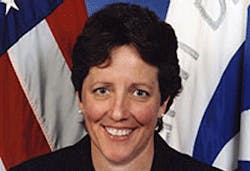Federal Motor Carrier Safety Administration (FMCSA) Administrator Annette M. Sandberg will resign her post effective March 1, according to a letter today she sent to The White House. She did not give a reason for her departure.
FMCSA recently has been dogged by legal challenges to its regulations, the most prominent of which involves the truck driver hours-of-service (HOS) rule that regulates the number of hours per day that drivers may operate. Currently there is a petition filed by the Owner-Operators Independent Drivers Assn. to the U.S. Court of Appeals for the District of Columbia Circuit to review two aspects of HOS. Some trucking industry observers suggest that Public Citizen and other groups may file their own lawsuits, pending FMCSA’s response to their petition.
In her resignation letter to President George W. Bush Sandberg noted:
“During my three year tenure we have made significant strides in improving commercial motor vehicle safety and security on our nation’s highways. In this time we have reduced the agencies regulatory backlog by over 68% and provided additional enforcement focus at the local, state and federal level—resulting in the lowest large truck fatality rate since the collection of data began in 1975.”
Sandberg’s resignation will leave FMCSA searching for a new chief administrator – the third in its short six-year life.
Sandberg had served as the chief of the Washington State Patrol for six years, part of a 17-year career with the patrol in law enforcement, supervisory and administrative posts, some of which included responsibility for motor carrier safety.
Though Sandberg is officially noted as the second chief administrator at FMCSA, unofficially she’s the third, following Joseph Clapp and Julie Cirillo, who bore the title “acting” FMCSA administrator after serving as the head the Office of Motor Carrier Safety (OMCS) since 1999. The formation of FMCSA in Jan. 1, 2000 effectively replaced OMCS. Bush nominated Clapp, a former Roadway Express executive, to run the agency in 2001.
Hours of Service (HOS) reform seems to have been the Achilles heel of each of FMCSA’s leaders. Cirillo shepherded the agency’s first attempt to revise HOS rules– an attempt that was stalled by intense criticism from both the trucking industry and public safety groups.
Clapp put HOS reform on the back burner following the Sept. 11, 2001 attacks to focus on trucking security needs and both Cirillo and Clapp retired at the end of 2002 while the agency was still reviewing the 50,000 comments it received for its proposed HOS revisions.
Sandberg guided the agency’s second attempt at HOS reform, which went into effect Jan. 1, 2004. But again HOS proved controversial – the Washington D.C. Circuit Court of Appeals officially threw the rules out in September of that year, leading to another set of rewritten rules issued Oct. 1, 2005.
Sandberg had believed that misconceptions about trucking contributed to the contentious and sometimes bitter wrangling over HOS reform.
“There's a misunderstanding out there in the public and among a variety of interest groups about trucking,” she told FleetOwner last year. “First, trucking is not one single industry – it is many different industries that are only similar in that they use a truck as a tool to conduct their business. The dilemma we face is that every segment of trucking uses that tool in a significantly different way. That's what the real issue is. People don't understand that one size doesn't fit all.”
About the Author
Fleet Owner Staff
Our Editorial Team
Kevin Jones, Editorial Director, Commercial Vehicle Group
Cristina Commendatore, Executive Editor
Scott Achelpohl, Managing Editor
Josh Fisher, Senior Editor
Catharine Conway, Digital Editor
Eric Van Egeren, Art Director
